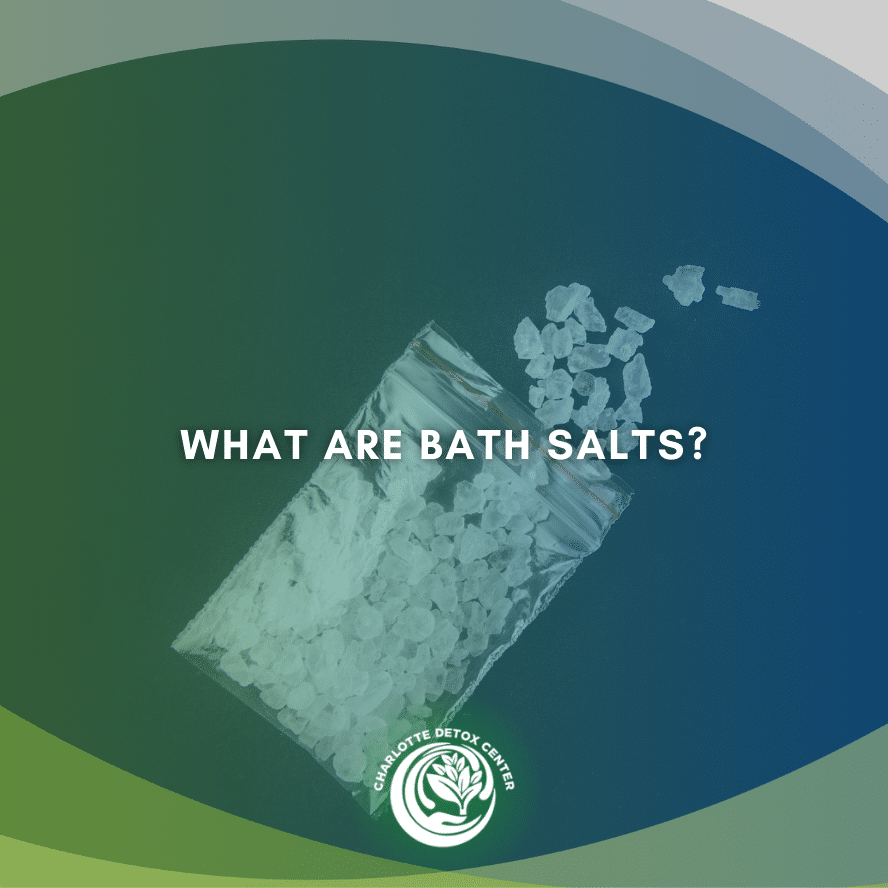What are Bath Salts?

Medically Verified: 2/1/24
Medical Reviewer
Chief Editor

All of the information on this page has been reviewed and verified by a certified addiction professional.
“Bath salts” is the slang term for substances known as synthetic cathinones. Synthetic cathinones are a man-made substance that is derived from the khat plant found in East Africa and Southern Arabia.[1] While people may abuse the khat plant on its own to experience stimulant-like effects, bath salts are a much more potent and unpredictable version of the drug.
Bath salts were becoming increasingly popular in 2011, being responsible for over 20,000 emergency department visits in just one year.[2] While bath salt abuse is not as common in recent years, they are incredibly dangerous and often used as an adulterant in other drugs like MDMA (ecstasy).
If you or a loved one frequently abuse bath salts, speak to one of our admissions counselors today to learn about your treatment options.
What Do Bath Salts Look Like?
According to the National Institute of Drug Abuse, bath salts belong to a class of drugs referred to as new psychoactive substances (NPS).[1] These substances are unregulated mind-altering drugs that have no medicinal use in the United States.
Bath salts are not regulated by the FDA, so there is no way to tell their potency or effects before consuming them.
Bath salts usually appear as a white or brown crystal-like powder. Oftentimes, they are packaged in containers or bags that appear store-bought, with labels claiming they are “jewelry cleaner” and “not intended for human consumption”.
According to the DEA, the street names and slang terms for bath salts include:[3]
- Bliss
- Blue silk
- Cloud nine
- Drone
- Energy-1
- Ivory wave
- Lunar wave
- Meow meow
- Ocean burst
- Pure ivory
- Purple wave
- Red dove
- Snow leopard
- Stardust
- Vanilla sky
- White dove
- White knight
- White lightning
Bath salts often come as a powder, so most people smoke or snort them. However, some individuals may inject bath salts intravenously after cooking them down into a liquid.
What are the Effects of Bath Salts?
Bath salts are most commonly abused for their stimulant-like effects, however, they can also produce symptoms of euphoria and hallucinations. While researchers are unsure of how exactly bath salts affect the brain, they have stated that they are chemically similar to drugs like cocaine, MDMA, and amphetamines.[1]
The effects of bath salts include:[3]
- Increased friendliness or talkativeness
- Increased sex drive
- Excited delirium
- Hallucinations
- Paranoia and panic attacks
- Increased heart rate and blood pressure
- Blurry vision
- Sweating and chills
- Anger or aggressive behavior
If you consume bath salts, you might experience a rush of energy, anxiousness, and even aggressive behavior. There are many different variations of bath salts, so it can be difficult to determine what effects you will experience. While some types of bath salts produce effects similar to amphetamines, others may cause hallucinations and heightened energy like MDMA or ecstasy.
What are the Signs of Bath Salts Addiction?
Bath salts are highly addictive due to their stimulant qualities. Once someone becomes addicted to bath salts, it can be incredibly difficult to stay sober without professional help. Thankfully, the signs of bath salts addiction are easy to spot, allowing you to notice early on whether your loved one requires support.
The signs and symptoms of bath salts addiction include:
- Sudden weight loss
- Sores near the mouth from smoking bath salts
- Nosebleeds or frequent runny nose from snorting the substance
- Frequent unexplained energy
- Slurred or disorganized speech
- Excessive sweating
- Poor hygiene
- Track marks on limbs from injecting the substance
- Loss of interest in previously enjoyed activities
- Changes in relationships with friends and family
- Social isolation
- Mood swings that include excessive happiness or aggression and hostility
- Loss of inhibitions
- Experiencing cravings or uncontrollable urges to abuse bath salts
- Needing more of the substance to experience the desired effect (building a tolerance)
- Experiencing withdrawal symptoms when they cannot use bath salts
Most people who intentionally abuse bath salts have a history of substance abuse. This means they might have abused other substances like methamphetamine, MDMA, or even cocaine before they moved on to bath salts. Anyone who frequently misuses bath salts will require assistance from a licensed drug rehab program to maintain long-term sobriety.
Find Help for Bath Salts Abuse and Addiction
If you or a loved one frequently abuse bath salts, it’s time to seek help. Whether you have been abusing bath salts for a couple of months or a few years, a licensed drug rehab facility can teach you how to live a life free of substances.
To learn more about our addiction treatment programs, contact Charlotte Detox Center today.
References:
- The National Institute of Drug Abuse (NIDA): Synthetic Cathinones, Retrieved July 2023 From https://nida.nih.gov/publications/drugfacts/synthetic-cathinones-bath-salts
- The National Library of Medicine (NLM): “Bath Salt” Use among A Nationally Representative Sample of High School Seniors in the United States, Retrieved July 2023 From https://www.ncbi.nlm.nih.gov/pmc/articles/PMC4551601/
- The Drug Enforcement Administration (DEA): Bath Salts, Retrieved July 2023 From https://www.dea.gov/sites/default/files/2020-06/Bath%20Salts-2020.pdf
